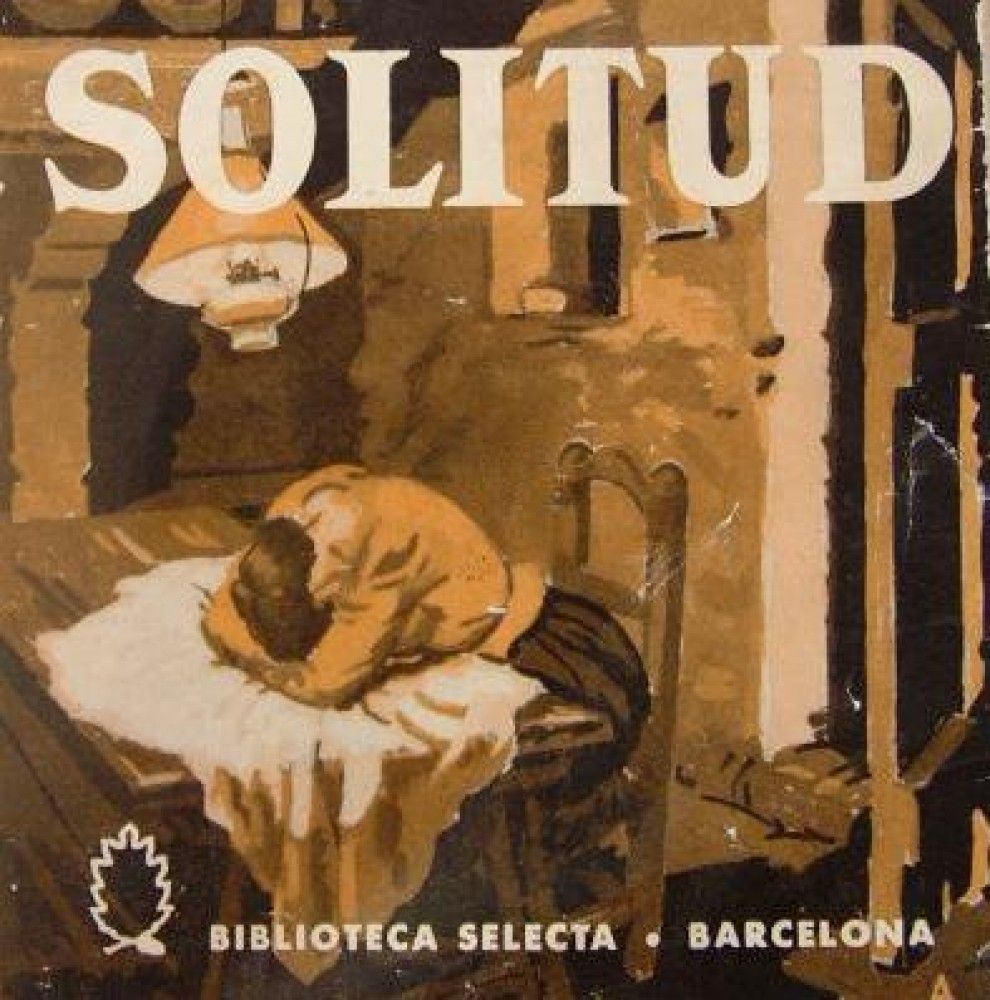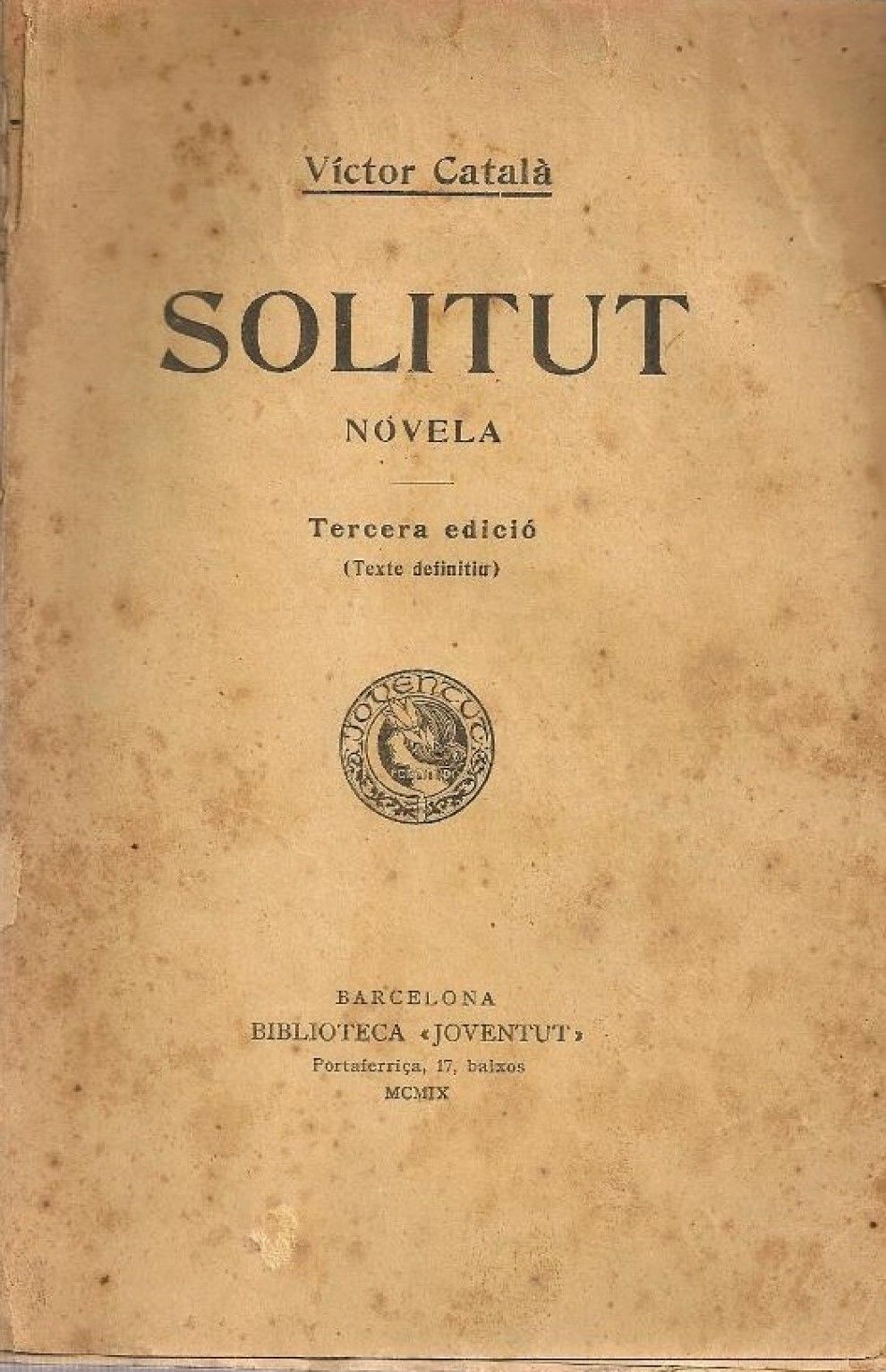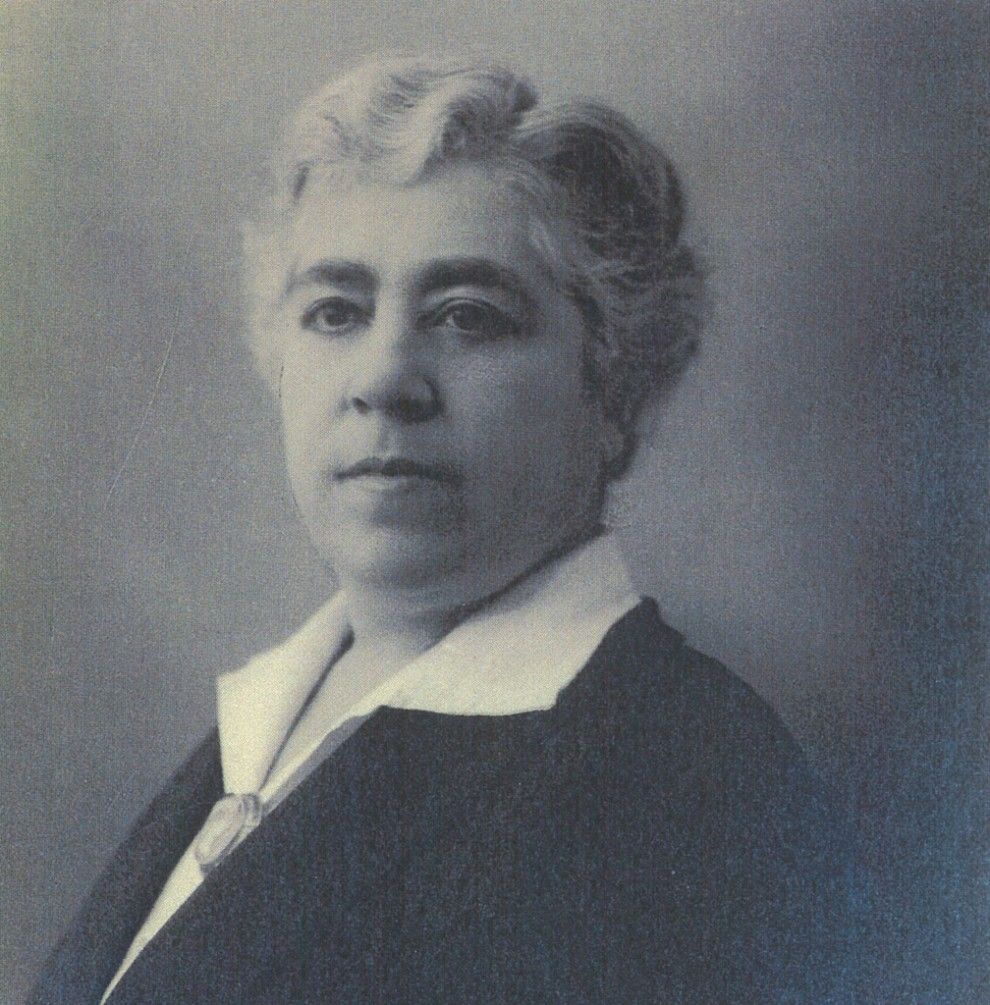Caterina Albert i Paradís, coneguda amb el pseudònim de Víctor Català, va morir el 27 de gener de 1966, ara fa 50 anys. La recordem amb l’inici de la seva novel·la més celebrada, «Solitud» (1905). I ho fem en tres llengües: català, anglès i alemany.

Foto: Frank Müller
I. La pujada
Passat Ridorta havien atrapat un carro que feia la mateixa via que ells, i en Matias, amb ganes d’estalviar el delit, preguntà al carreter si els volia dur fins a les collades de la muntanya. El pagès, rialler i encantat de trobar una estona de conversa, li féu de seguida lloc a son costat en la post travessera, i digué a la Mila que s’ajoqués darrera d’ells, sobre el bossat. Ella guaità amb agraïment a n’aquell home desconegut, que li feia semblant mercè. Malgrat la bona cama que tenia, estava fatigada. Son marit li havia contat que de Llisquents, on els deixà l’ordinari, fins a Ridorta, hi havia cosa de mitja horeta, i ja feia cinc quartassos que caminaven quan vegeren negrejar el campanaret del poble dalt del turó verdelós: d’aleshores fins a trobar el carro havia passat un altre quart llarg i entre el solei, la polseguera i la contrarietat, li havia donat un gran malhumor a la pobra dona.
Tantost encauada en son niu de l’estora, amb el farcellet de la roba al caire i l’esquena arrimada a un coster, es desféu el mocador que duia com una teuladeta sobre la cara, i agafant-lo pels becs l’esbategà contra les galtes. Estava acalorada, i l’aire fresquívol del mocador li passà pel coll i polsos com una manyaga dolça i una mica esgarrifadora que la resseguí tota: mes, al parar de ventar-se, es trobà més reposada i serena per guaitar les belleses d’aquells camins que tantes vegades li havia ponderat en Matias.
Mirà d’una banda i altra. Per darrera del carro fugia cap avall, fent tortes i esbiaixades, la carreterota veïnera, plena de sots, de roderes fondes i de crestes de fang ressec, que el pas de les rodes anava escantellant poc a poquet, amb catxassa tan perfidiosa, que fins al pic de l’estiu no les deixaria mal arranades. Aleshores la carretera s’allivellaria amb matalassos de pols per una temporada, fins que la tornessin a malmetre els xàfecs tardorencs.
A l’esquerra del carro s’aixecava un marge alterós, més eixit de dalt que de baix, com a punt d’esllavissar-se sobre el camí, però contingut per paretotes seques i desiguals, ventrudes ací i allà i més perilloses que el marge mateix. Al cim s’arrapaven les tanques de les feixes, fetes, a trossos, amb atzavares assocades, quals fulles, testes i polpudes, ferien l’espai com glavis apomellats, i, a trossos, amb tamarius de brancada bellugadissa o rengleres d’arns que aleshores començaven sa blanca florida tota enrondada de punxes.
De l’altra banda, i a cosa de cana i mitja per sota la carretera, s’estenia el pla de Ridorta, abraçat al turó i tot ell divís en partions simètriques, mateix que un gran tauler d’escacs. Aquestes partions eren els horts de regadiu, la riquesa del poble, esmerçada a bocinets entre tots els veïns, mercès a antics establiments emfitèutics. Aleshores s’hi veien virolejar arreu les notes frescals i alegres de la verdura tendra, clapejant la grogor colrada del terrer, enmig dels viarons d’aigua clara, que espurnejaven al sol com llenques d’espill.
La Mila quedà ullpresa de tanta hermosura. A n’ella, la filla de la gran planúria, magra per falla de braços, d’aigua i d’adob, li semblà que no podia ésser veritable, sinó que la veia per virtut d’un miratge fantasiós, aquella altra planúria petiteta que, enclosa entremig d’un turó ple de cases i d’unes muntanyes de pedra crua i erma, tenia tan fecunda i riallera vida. Ni un pam de lloc vagatiu, ni una mala herba xuclant-se els sucs del terrer! Tot conreuat, tot girat de sota a sobre per l’aixada o per la fanga, tot amanyagat i servit a tall de senyor, tot fruitant superbament, amb una gran liberalitat d’amor i de bona volença!
Allà baix, en la terra de la Mila, la gent s’esgranava pels camps espaiosament, posant força tros entre uns i altres, i per les vores i marges amplíssims, coberts de brostam i mengia de tota mena, verdejaven al sol els lluerts i pasturaven les herbotes resseques quatre vaques magres, que reganyaven el costellam, despullat com unes graelles i uns ossos de les anques tan punxeguts, que cuidaven a foradar-los-hi la pell. Aquí no se n’hi veia una de bèstia de mal profit, mes les persones hi estaven espesses com els dits en les mans: una munió de dones, com peces del gran joc, escampades arreu pel tauler, bellugaven, feineres i escarrassades com abelles, masegant la terra, fent muntar i baixar les poualanques, calçant la vianda o reposant sota la pampolada d’una figuera: totes amb les faldilles doblegades, els mocadors sobre la cara i braços i cames nus, adobant-se i embrunint-se al sol.
La Mila, tot guaitant-les, sentí que se li esbatanava son ànima calda de terrassana i que un anhel, una fal·lera dolçament ofegada, l’empenyia a baixar del carro, a ficar-se per aquells horts i grapejar també, com les dones aquelles, la terra tèbia, les fulles humides, l’aigua regalada que s’esmunyia pel mig de les balques, quals flors d’or capejaven senyorívolament arran de marge.
En Matias havia tingut raó: era bonica i riallera l’encontrada de Ridorta, d’aquell poblet amuntegat dalt del turó i voltat per l’anella vistosa d’una faixa de pla; i essent l’encontrada alegre no podia pas ésser tan trista com algú havia anat a contar-li a n’ella, l’ermita de la muntanya. La Mila es figurà que semblaria un niuet penjat en un arbre, i que així que treuria el cap a la finestra veuria sota seu la meravella d’aquest gran clap esbalaïdor. Oh, si amb el temps pogués tenir-ne un per a ella, per a menar-se’l a son gust, d’hortet mirífic, ja no li doldria haver deixat la seva terra per sempre més!
Animada per semblants pensaments, es girà, desitjosa d’enraonar-ne amb el seu home; mes, a la vista de les dues esquenes que se li dreçaven al davant, les paraules se li fongueren en la llengua, i la idea animadora que anava a eixir de son cau, se n’hi tornà sobtadament endins com una bestioleta poruga.
Els dos homes conversaven catxassudament; sense fixar-s’hi, ella entressentí els mots fredor… tristesa… vedells… massa alt… però no va saber de què parlaven perquè el cor i el pensament li fugien del carro, entornant-se-n’hi cap a la terra. Mes l’encís ja estava romput i la terra, bella i tot com suara, no logrà revifar-li el caliu d’aquell primer anhel. Amb un deix de tristor desvià la mirada, enlairant-la: el cel era un gran badiu ple de claror encegadora que feria dolorosament els ulls assadollats… Mirà pel trau que quedava entre els dos homes: quelcom verdejava uniformement al lluny, com una bella catifa estesa… Tornà a fixar-se en les dues esquenes: una, la del pagès, era magra i osssosa, com les vaques aquelles de la gran planúria, i portava enganxada, talment com si li fes de pell, una camisa de bordets esmolats que sentia a suor i a terragada. L’altra esquena, ampla i tova com un coixí, semblava voler eixir-se del gec negre que l’oprimia, tibant d’aixella a aixella amb una amenaça constant d’estripar-se.
«Com s’ha engreixat aquest home, del casament ençà!» pensà la Mila, reparant novament que tot se li havia empetitit, fins al punt de fer-lo semblar estrafet i enfarcellat com un tarlà. El mateix barretet de feltre, que abans li estava tan bé, anava poc a poc prenent-li aires de solideu de capellà, i en aquell punt, a cada banda de solideu se li eixamplaven les dues orelles, enceses i transparents contraclaror, mateix que dues anses de vidre espès. Més avall, la ratlla travessera del coll planxat, ressortint de la negror del gec i del to calent del bescoll carnós, tenia fredors crues de marbre.
De «Solitud». Barcelona: Edicions 62, 2005 (primera edició: Selecta, 1905)

Sobrecoberta de l’11a edició a Selecta (1972).
I. The Ascent
After passing through Ridorta, they had come across a wagon going their way and Matias, who wanted to preserve his strength, asked the driver if he would mind taking them as far as the foot of the mountain. The peasant, beaming at the prospect of a little conversation, made room for the man by his side and told Mila to make herself comfortable on the straw mats at the back. She looked gratefully at that unknown benefactor, for though strong, she was exhausted. Her husband had said the trip from Llisquents, where the delivery man had left them, to Ridorta would take less than half an hour, but they has been walking at least an hour and a quarter when they saw the town’s blackened steeple rising above the green hill. Another fifteen minutes passed before they saw the wagon, and what with the sun, the dust, and the rough dirt road, the poor woman had fallen into a very bad temper.
Once settled, with her back to the man and her bundle of clothes beside her, she untied the kerchief around her head and, taking the ends in her hands, beat it to fan her face. She was hot, and the cool breeze flowed over her temples and neck like a gentle though slightly unnerving caress. When she stopped fanning herself, she felt calmer and ready to look at the pretty sights Matias had so often described.
She gazed from side to side. Behind them, the road twisted and turned, full of holes, tracks, and caked, muddy ridges the wagon wheels wore down with such excruciating slowness that they would not be level till the middle of summer. Then the road would become a sea of dust till the autumn rains returned.
On the left was a high embankment that jutted out at the top, as though about to cave in onto the road, but it was held back by rough, uneven walls that bulged here and there and were more dangerous than the embankment itself. Above them were fields enclosed by rows of magueys, whose stiff, fleshy leaves slashed the air like bouquets of swords, and, in some places, by swaying tamarisks and rows of buckthorn, whose white blossoms, girded by thorns, had just begun to flower.
On the other side, starting a couple of yards from the road, the Ridorta plain began, hugging the base of the hill and divided into small symmetrical patches that looked like a big checkerboard. Those irrigated fields were the town’s riches, subdivided among its inhabitants by ancient feudal contracts. The brilliants colors of sprouting vegetables dotted the scorched brown earth, among ditches whose water glistened in the sunlight like bright strips of mirror.
Mila was dazzled by such lushness. A child of the lowland plains, barren for want of hands, water, and fertilizer, she started incredulously at what seemed a fantastic mirage: that other litlle plain which, nestled between a hillside covered with houses and several harsh, stony mountains, nourished this fertile and joyous existence. Not one square foot wasted, not one weed stealing the earth’s goodness! Everything tilled, everything turned upside down by hoes and pitchforks, everything pampered like a lord, everything proudly blossoming with abundant generosity!
Down below, in Mila’s country, the people were scattered through the land, with great stretches between them. Among thick hedges of bug-infested bushes, green lizards flashed in the sun and a few emaciated cows, whose ribs stuck out like bars and whose anklebones were so sharp they nearly pierced the hide, tugged at the few dry weeds. Here no such useless beast could be seen, and the people were as close-set as fingers on a hand: a crowd of women, clustered like chessmen on a board, swarmed like industrious ants across the fields, raking the earth, raising and lowering the chain pump, heaping soil around the vegetables or resting in the shade of a fig tree, all with their skirts hiked up, kerchiefs on their heads, and bare arms and legs, tan and healthly in the sun.
As she gazed upon them, Mila’s farmgirl soul filled with an urge, a wistful longing to leap from the wagon, run into the fields and, like those women, plunge her hands into the warm earth, the wet leaves, the water flowing between rushes, whose yellow flowers nodded gravely beside the irrigation ditches.
Matias had been right: Ridorta was a cheerful place, a town perched upon a hill and ringed by fields. And if the district was so happy, the hermitage above it couldn’t be as gloomy as she had heard. Mila imagined it as a little nest where, as soon as she stuck her head out the window, she would gaze down upon this marvelous vista. On, if she could only clear her own little garden and plant it as she liked, she would never regret having to leave her village forever!
Excited by these thoughts, she turned to share them with her husband, but at the sight of those two backs, the words died in her throat and the hopeful idea that had been about to venture forth scurried back into its lair like a frightened animal.
The two men spoke slowly, without noticing her, and she half-caught the words: “Cold… gloomy… calves… too high,” but she never learned what they were talking about because her thougths fled back to the fields. The spell, however, had been broken, and the land, just as beatiful as it had been a moment ago, could not rekindle her first enthusiasm. She sadly turned and looked upward: the sky, vast and empty, blazed with blinding light that hurt her eyes. She peered through the crack between the two men: there was something uniformly green in the distance, like a splendid carpet… She looked again at the two backs: one, the peasant’s, slender and bony like those cows in her district, was clad in a cheap shirt, worn thin by many washings, that smelled of sweat and charcoal dust. The other back, broad and soft as a pillow, strained against the black jacket that stretched from armpit to armpit, as if in constant danger of ripping asunder.
“How fat he’s gotten since we married”, thought Mila, remembering how tight all his clothes had become, so that he seemed crammed into them like a straw doll in its rags. The felt hat that had previously suited him so well had gradually come to look like a priest’s calotte, and his ears, which stuck out on either side, were red and translucent like tinted glass. The crease on his starched collar, set against the black jacket and folds of flesh, had the icy pallor of marble.
Fragment of «Solitude». Columbia: Readers International, 1992.

Tercera edició de l’obra. Foto: Biblioteca Joventut
I. Der Anstieg
Hinter Ridorta hatten sie einen Wagen angehalten, der den gleichen Weg zurücklegte und Matias, der ihre Kräfte schonen wollte, fragte den Fahrer, ob er sie bis zum Gebirgspass mitnehmen könne. Der Bauer, ein fröhlicher Mensch und erfreut darüber, für eine Weile Gesellschaft zu haben, machte ihm sofort neben sich auf der Querbank Platz und sagte zu Mila, sie solle sich hinter sie kauern, in ein Tragenetz. Sie blickte dankbar diesen unbekannten Mann an, der Mitleid mit ihr zu haben schien. Trotz ihrer kräftigen Beine war sie müde. Ihr Ehemann hatte ihr erzählt, dass es von Llisquents, wo sie der Ordinarius abgesetzt hatte, bis nach Ridorta ungefähr eine halbe Stunde Weg sei, und nun waren sie schon fünf lange Viertelstunden unterwegs, als sie endlich den schwarzen Kirchturm des Dorfes hinter einem grünen Hügel auftauchen sahen: bis sie von diesem Zeitpunkt an den Wagen fanden, war wieder eine lange Viertelstunde vergangen, und das alles, zusammen mit der Sonne, dem Staub und dem beschwerlichen Weg, hatte die Laune der armen Frau immer schlechter werden lassen.
Sobald sie es sich aber in ihrer Nische auf der Matte mit einem Kleiderbündel darauf bequem gemacht hatte und den Rücken an eine Wagenwand lehnte, löste sich das Tuch, dass sie wie ein Dächlein über dem Gesicht trug und als sie es an den Ecken ergriff, schlug es ihr gegen die Wangen. Sie war erhitzt und der kühle Lufthauch des Tuches an ihrem Hals und Wangen war wie eine süße Liebkosung, die sie ein bisschen erschauern ließ und sie ganz erfüllte: mehr noch, als sie aufhörte sich Luft zuzufächeln, fühlte sie sich ausgeruht und heiter genug, um die Schönheit der sie umgebenden Landschaft zu betrachten, die ihr Matias so viele Male angepriesen hatte.
Sie blickte sich nach allen Seiten um. Hinter dem Wagen führte der Weg nach unten, mit vielen Biegungen und Abzweigungen, daneben die Landstraße, voller Pfützen, tiefer Schlaglöcher und Resten trockenen Schlamms, den die Räder im Fahren nach und nach mitschleiften, so unausweichlich, dass im Hochsommer alles weg sein würde. Dann würde die Straße eine Zeit lang mit Staubwolken bedeckt sein, bis die herbstlichen Stürme sie wieder in den gleichen schlechten Zustand versetzen würden.
Links vom Wagen erhob sich eine gewaltige Böschung, oben breiter als unten, so als ob sie sich auf den Weg stürzen wollte, aber gestützt durch trockene und ungleichmäßige Wände, hier und dort ausgebeult und gefährlicher als die eigentliche Böschung. Obendrauf klammerten sich terrassenartig Hecken, dazwischen teilweise abgeschnittene Agaven, deren Blätter, fest und fleischig, wie eine Handvoll Schwerter in die Hecken hineinragten, teilweise Tamarisken mit sich lebhaft bewegendem Geäst oder Reihen von Dornenhecken, die gerade ihre weiße Blüte begannen.
Auf der anderen Seite, einige Meter unterhalb der Straße, begann die Ebene von Ridorta, an den Hügel geschmiegt und ganz in kleine symmetrische Felder aufgeteilt, so wie ein großes Schachbrett. Die Felder waren kleine, bewässerte Obstgärten, der Reichtum des Dorfes, stückchenweise zwischen allen Bewohnern aufgeteilt, dank alter Erbvereinbarungen. Jetzt sah man dort ringsherum erste fröhliche Anzeichen des frischen, zarten Grüns wachsen, welches das bräunliche Gelb des Bodens durchsetzte, und in der Mitte die Bewässerungsgräben voll klarem Wasser, die den Boden wie Ackerfurchen durchzogen.
Mila konnte ihre Augen von so viel Schönheit nicht abwenden. Ihm, dem Mädchen aus der großen Ebene, ausgedörrt, weil es ihr an Arbeitskräften, Wasser und Düngung fehlte, kam das alles unwirklich vor, ihr schien alles wie ein Zauberspiegel, dass diese kleine Hochebene, umschlossen von einem Hügel voller Häuser und von nackten Steinbergen, so ein fruchtbares und fröhliches Leben aufwies. Kein Stück braches Land, kein Unkraut, das die Säfte der Erde verschlang! Alles umzäunt, alles von oben bis unten gehackt oder gepflügt, alles liebevoll angelegt und bestellt, alles üppig wachsend, mit großer Freigebigkeit und gutem Willen!
Dort unten, in Milas Heimat, verteilten sich die Menschen auf weites Land, ließen zwischen den Feldern möglichst viel Platz, hielten die Raine sehr breit und ließen sie von Laubwerk und Unkraut aller Art überwuchern, dort sonnten sich die Eidechsen und weideten einige magere Kühe die trockenen Gräser, abgemagert bis auf die Rippen, wie Skelette und mit spitz herausstehenden Beckenknochen, die ihnen beinahe die Haut zu durchbohren schienen. Hier hingegen sah man kein schlecht genährtes Tier, aber die Menschen waren dünn wie die Finger an der Hand: ein Haufen Frauen stand, wie Schachfiguren an einer Tischplatte und regten sich, arbeitsam und eifrig wie Bienen. Sie bearbeiteten den Boden, hoben und senkten Harken, bereiteten Essen zu oder ruhten sich im Schatten eines Feigenbaumes aus: alle mit hochgeschlagenen Röcken, Tüchern über Gesicht und nackten Armen und Beinen, gerbten sie ihre Haut, die in der Sonne bräunte.
Als Mila sie beobachtete, spürte sie, wie sich ihr als Flachländerin das Herz öffnete und wie der, lange insgeheim vorhandene Wunsch in ihr aufkeimte, vom Wagen zu springen, in die Gärten zu gehen und ebenso wie jene Frauen die weiche Erde, die feuchten Blätter, das rieselnde Wasser zu greifen, das mitten aus dem Schilfrohr hervorsprudelte, dessen goldene Kolben sich hoheitsvoll am Uferrand im Wind wiegten.
Matias hatte Recht gehabt: Die Ankunft in Ridorta, diesem versteckten Dorf oben auf dem Hügel, umgeben von der ringsherum sichtbaren Ebene, war schön und fröhlich; und da die Ankunft schon fröhlich war, konnte diese Einsiedelei mitten in den Bergen nicht so traurig sein, wie ihr jemand erzählt hatte. Mila stellte sich vor, dass es wie ein Nest auf einem Baum war und dass sie, wenn sie den Kopf aus dem Fenster hielt, unter sich das Wunder dieses erstaunlichen Fleckchens Erde sehen könnte. Oh, wenn sie nur mit der Zeit auch so einen kleinen Garten für sich haben könnte, den sie nach ihrem Geschmack anpflanzen könnte, dann würde es sie auch nicht länger schmerzen ihre Heimat für immer verlassen zu haben!
Von ihren Gedanken angespornt drehte sie sich um, beseelt von dem Wunsch, sich mit ihrem Mann zu unterhalten; aber als sie die zwei ihr zugewandten Rücken vor sich sah, blieben ihr die Worte im Halse stecken und die anregende Vorstellung, die sich in ihr geregt hatte, verschwand sofort wieder, wie ein furchtsames Tier.
Die beiden Männer unterhielten sich angeregt; ohne dass sie ihnen ihre Aufmerksamkeit schenkte, hörte sie Worte Kälte… Traurigkeit… Kälber… zu hoch… , wusste aber nicht, worüber sie sprachen, weil ihr Herz und ihre Gedanken abschweiften und sie den Kopf zu Boden senken ließen. Aber der Zauber war bereits verflogen und das Land, so schön und weich, konnte in ihr nicht mehr die warmen Gefühle dieses ersten Verlangens auslösen. Mit einem traurigen Seufzer ließ sie ihren Blick umherschweifen und hob die Augen: der Himmel war ein weites Feld voll blendender Helligkeit, die schmerzhaft in den übersättigten Augen stach … Sie blickte durch den Spalt zwischen den beiden Männern: in der Ferne gleichmäßiges Grün, wie ein dichter, schöner Teppich… Sie lenkte ihren Blick wieder auf die beiden Rücken: einer, der des Bauern, war mager und knochig, wie die der Kühe in der Hochebene, und er trug ganz eng anliegend, wie eine zweite Haut, ein Hemd mit abgewetzten Nähten, das nach Schweiß und Staub roch. Der andere Rücken, breit und weich wie ein Kissen, schien sich aus der schwarzen Jacke, die ihn einengte und zwischen den Achseln spannte und ständig aufzureißen drohte, aufrichten zu wollen.
«Wie dick dieser Mann geworden ist, seit der Hochzeit!» dachte Mila, und bemerkte auf Neue, dass ihm alles zu klein geworden war und schließlich eng und faltig wie ein Talar schien. Sogar der Filzhut, der ihm vorher so gut gepasst hatte, ähnelte nach und nach immer mehr einer Priestermütze, und auf beiden Seiten der Mütze spitzen die Ohren hervor, erhitzt und im Gegenlicht durchsichtig, so wie zwei dicke Glashenkel. Der Falz des gebügelten Kragens weiter unten, der sich vom schwarzen Anzug und vom warmen Farbton des fleischigen Nackens abhob, schien ganz kühl, wie aus Marmor.
Traducció de David H. Rosenthal.

Caterina Albert i Paradís (1869-1966).
Laura Borràs parla de l’obra:
Maria Campillo i «Solitud»:
Lletres d’or, Víctor Català:

